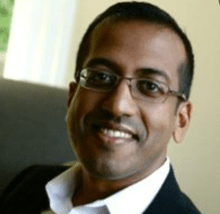
On Thursday, September 30, 2021, the Cornell Baker Program in Real Estate welcomed Neel Shah as a speaker in this Fall’s Distinguished Speaker Series. Mr. Shah is the Principal and Founder of Shah Capital Advisors, an advisory firm specializing in helping sponsors navigate obtaining the benefits of the New Market Tax Credits (NMTC) program.
Shah Capital Advisors has successfully closed over $1 billion of real estate financings utilizing NMTC and working with developers and non-profits to bring impact-focused projects to underserved communities throughout the U.S. The majority of Shah Capital Advisors clients are non-profit entities including health centers, charter schools, youth-focused community facilities, behavioral health agencies, and homeless services organizations. Mr. Shah obtained a bachelor’s degree from Brown University and a Master’s in Business Administration (MBA) from the Kellogg School of Management.
Mr. Shah credits his early career in banking and private equity as the foundation that helped him see the possibilities of a profession within community development and investment. Mr. Shah began his career at Salomon Brothers in their project finance division. During his time there, Mr. Shah worked on local infrastructure projects and learned how to underwrite loans for development projects. After Salomon Brothers, Mr. Shah worked for the Atlantis Water Fund, a private equity fund investing in water infrastructure in emerging markets including Mexico, Brazil, China, and India. Mr. Shah recalls felling unsatisfied with the reluctance of institutional investors to invest in communities that he felt needed the most investment but were seen as overly risky from an investor perspective. Mr. Shah was eager to utilize the skills he gained from his experiences with large institutional investors to create something entrepreneurial that would have a lasting impact on local communities within the U.S.
Mr. Shah started Shah Capital Advisors (SCA) in 2010, after working within the larger community development finance industry. Mr. Shah shared that the goal of the NMTC program is to drive private capital to typically underserved and underbanked communities throughout the U.S. Mr. Shah describes the NMTC program as a “tool for private and public sectors to come together to develop projects in severely distressed census tracts” which is defined as areas with poverty rates exceeding 30% and Benchmarked Median Family Income of less than 60%. Most of Mr. Shah’s clients are non-profit entities that are typically relying on Mr. Shah to guide them through their first real estate transaction. Unlike other federal programs that support the needs of low-income communities like the Low-Income Housing Tax Credit (LIHTC) program with a deeper subsidy of as much as 90 percent of a project’s capital stack, the NMTC program typically fills 15 to 20 percent of the capital stack. SCA helps their clients navigate the complexities of attracting NMTC financing and helps them arrange term loans and bridge loans to complete their capital stack. Mr. Shah described the great responsibility he feels to help his clients, who are usually first-time real estate developers, navigate the financing hurdles of construction financing and NMTC subsidies.
Mr. Shah expressed great pride as he described his involvement in securing funding for a community facility in Chicago, IL. Mr. Shah described an underserved area of Chicago where 57 percent of adults have been on probation, parole, incarcerated, arrested, or had a criminal background, resulting in a 40 percent unemployment rate and 41 percent of households living below the poverty line. Mr. Shah and his team worked with a non-profit workforce training company that designed a campus within the local area that provided financial coaching, career training, and job placement support to create opportunity for community. In addition, Mr. Shah described that an integral part of the development was that for persons returning from the criminal justice system who found it particularly difficult to find willing employers, the sponsor created a honey-making social enterprise to hire them and offer job-training with portable skills that would help them develop a track record. Further, Mr. Shah explained that the new campus included a demonstration kitchen that was designed to highlight honey-making as well as a coffee and tea café employed by community residents. Mr. Shah highlighted the success of this development to emphasize that there are opportunities that can create incredible value for communities in need, while also meeting financial expectations of investors.
Feeling a sense of responsibility for his clients, was a focus of Mr. Shah’s speech. He emphasized that due to the essential social goods and services offered by projects his clients are proposing, the stakes for a successful project are often very high. Many of the clients Mr. Shah works with lack real estate development experience; however, Mr. Shah explained that “a successful project means people could gain access to healthcare, access educational opportunity within a disadvantaged community, or allow individuals with barriers find a way to access job opportunities.” Mr. Shah finds his passion through the success of his clients and the lasting impacts made on their local communities. Mr. Shah is hopeful that exposing students to tools such as New Markets Tax Credits will attract students to consider careers within emerging communities (i.e. the community development finance industry).
